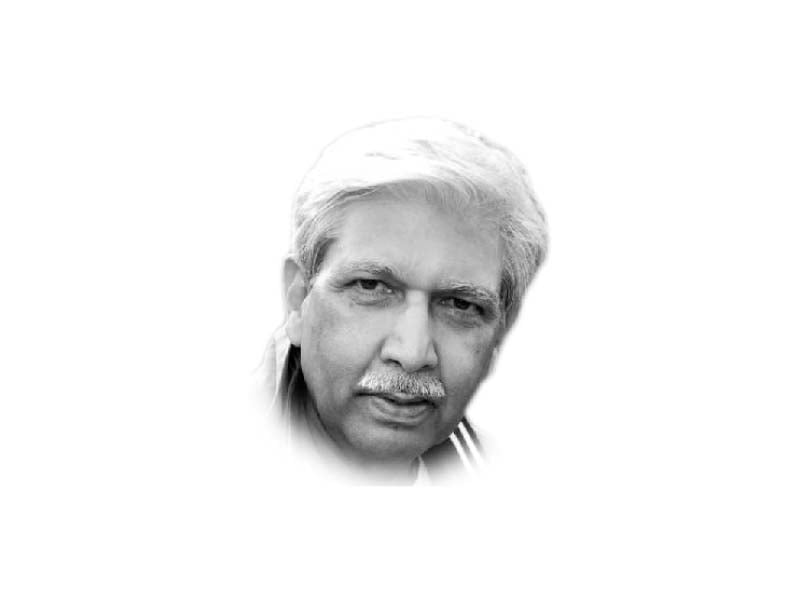
It may not be fair to hold the PML-N alone to such scrutiny but since there is such hullabaloo about the narrative that the PML-N claims, it is just right to investigate it further. PML-N’s Daska win is ascribed to the narrative. The trouble is the PML-N has been winning this seat for ages. Late Iftikhar Hussain Shah whose illustrious daughter defeated PTI’s Asjad Malhi had won five times from this constituency. He won it as indeed did many others representing the PML-N for the Punjab Assembly from this constituency when there were no claims to any narrative. So it will be a stretch to credit a narrative, spins notwithstanding. I say give it to the Late Shah Sb and now his eminent daughter.
That’s the beauty of politics in Punjab. They have constant and trusted horses for winners. Just wade across the Chenab and you enter the Late Zahoor Elahi territory. The Chaudhrys of Gujrat are his venerable heirs. Regardless of which party they belong to or are a part of they always win. These are called inheritance seats or jaddi pushti in the colloquial expression. And they are no mean politicians. Chaudhry Shujaat Hussain has his reputation and so does Chaudhry Pervez Elahi. Now the next generation too is in the field. The other brothers and cousins win the local bodies and Gujrat city’s municipal chairmanship. This is standard and a given; narrative or no narrative.
As you move to southern Punjab gaddi nasheeni comes in play. These are the inheritors of the religious traditions that a forefather may have been the founder of and now generation after generation their scions hold the fort and the constituency. They win it on their own merit, not on the basis of any narrative. Instead a narrative will attach itself to these perpetual winners of their constituencies. Spins notwithstanding. In the Punjab between you have families in politics who will hold sway the fort of constitutional representation. These too stand out for being large landholders or religiously eminent or both. Hence the electables of Punjab and their politics. And this has been forever. Even the Quaid when he was leading the struggle for Pakistan needed them attached to his idea and his political stakes. Without it the Sardar Khizar Hayat ministry wouldn’t be dislodged and a more compliant Sardar Shaukat Hayat not emplaced making the idea of Pakistan a reality. Fed on shorthand staples kept alive by social media our recent generations need to know their history better for a more comprehensive understanding of politics and its nuances.
Just as the rural constituencies will have their constant wielders so do the urban ones in Punjab boasting political families who partake of social eminence and influence. There will always be exceptions when the newly moneyed through their indulgence in trade, industry or real estate will spin enough to try their hand at politics but then over time they make it their consistent ownership. Sometime they will lose at the hand of their opposing contender but even the contenders are consistent over decades. This may be truer of the rurals but in cities too surprises are minimal because if not one it shall be the other; never an unknown. This rule was most brilliantly trumped by only one in our political history — Zulfikar Ali Bhutto. Whomever he awarded the ticket, especially in 1970, he was a winner. But then there are few and far between who translate charisma into such wholesome domination. Imran Khan can take the credit for agitating and widening the voter base but without the induction of electables forming a government may have only been a pipe dream.
What do these electables want and why they dwell in politics? Literally, eminence and influence and perpetuity. No narrative, no ideology and no blind loyalty; the slogans which tend to get ascribed to these ladies and gentlemen. Some of them are long time loyalists and will stand by their leadership regardless of what slant they bring in a mantra — which usually satisfies a given political context — but those are few and far between. Though Pakistan’s polarised politics has of late provided an impetus for such leanings, the ideology or a narrative is what the leader states it is. They wouldn’t give a fig if the leader’s party carries an N, S, C or a Q as a suffix along with whatever ideology it may propound. The myth of the common man too needs to be seen in a similar perspective. The common man or the votes belong to the electable not a party, ideology or a narrative — spins notwithstanding. Zaray Shah will always win; it is up to Zaray Shah or now his progeny to decide who they align with.
Such level of personalised commitment borders on a cult which anyway blights politics and is against its philosophical grain but that is then what differentiates Pakistani politics from the rest. Note, I use politics to explain representative governance, not democracy, which is an abysmal characterisation reflecting poorly for what goes as politics and democracy. Another specificity of this kind of politics is lain in the opposing contenders who as committed hereditary wielders in a constituency will competitively oppose the other regardless of which political each may represent. Were one to change to another denomination the contender too will change to the opposing platform. The essence is in opposing and winning not ascribing to an ideology or a narrative.
So what really is the narrative? Evolved from mujhay kyon nikala (why was I replaced) to vote ko izzat dou (respect the mandate) the thrust remains only one: anti-establishment or more specifically anti-army. The PML-N feels it has a reason for such rancor and many may agree but for it to become emblematic of ideological leaning is a stretch too far. It is true that the military in Pakistan has always had a role in politics and nation’s governance either as a tradition or in support of a political government — for truer democracy that may not be the case — but to frame such idiosyncrasy as an ideological mantra is quite opportunistic given the backdrop in which such evolution has materialised. One can understand why it serves PML-N’s leadership’s interests now but it remains essentially self-serving. It is worthy enough as a long-term goal of the entire political structure but that takes a lot of doing to reach that end. For the moment politics and politicians remain at the lowest rung of efficacy and credibility in the nation’s perceptual hierarchy. This must not be the case.
There is many a political expedience in the PML-N appearing confrontationist and agitative serving intra-party interests and in shaping party’s future construct but to, in actuality, distance the country’s military from its role in politics the latter as an entity will need to become self-reliant, robustly democratic and efficacious. Second, along with robustness it must be above board in all its functions and conduct. Army’s role — real and perceived — is best eased out than ordered out. Latter recourse will only invite an undesired repulse. And finally, credibility in its all-encompassing sense is what shall deliver supremacy not whining for it.
Published in The Express Tribune, April 16th, 2021.
Like Opinion & Editorial on Facebook, follow @ETOpEd on Twitter to receive all updates on all our daily pieces.

1732090022-0/Elmo-and-Amelia-(1)1732090022-0-405x300.webp)
1725523665-0/Minecraft-Movie-(1)1725523665-0-165x106.webp)

1732089759-0/BeFunky-collage-(75)1732089759-0-165x106.webp)







COMMENTS
Comments are moderated and generally will be posted if they are on-topic and not abusive.
For more information, please see our Comments FAQ